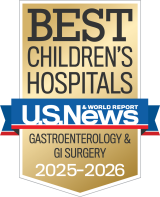Pediatric Gastroenterology
With specialized expertise in pediatric gastroenterology, our experts lead the nation in effective care. We help babies and children of all ages, offering diagnosis, management, treatment and support for gastrointestinal (GI) and nutritional disorders.


Why choose UCLA Health for pediatric gastroenterology?
As part of the Division of Pediatric Gastroenterology, Hepatology & Nutrition at UCLA Mattel Children's Hospital, our team works together to deliver world-class care. Highlights of our program include:
Recognized expertise: Our program is consistently ranked among the top pediatric gastroenterology programs in the nation by U.S. News & World Report. Experienced UCLA Health GI specialists are nationally and internationally recognized for their expertise in celiac disease, inflammatory bowel disease (IBD) and more.
Multispecialty team: Pediatric gastroenterologists, surgeons, registered dietitians, social workers and psychologists come together to care for children with IBD and other conditions. With a strong focus on optimizing overall health, we help children pursue an active, healthy lifestyle while managing gastrointestinal (GI) conditions. We also offer a transition-of-care program to help older pediatric patients move seamlessly into the care of adult gastroenterology specialists.
Leaders in organ transplantation: If your child needs a transplant, you can trust UCLA Health to deliver the highest level of care. UCLA Health was among the first centers in the nation to establish a program of intestinal transplantation. Ours is one of the largest, most experienced pediatric transplantation programs of its kind in the nation. Learn more about pediatric intestinal transplantation.
Research and clinical trials: To continue to make treatments more effective, we offer multiple research studies to treat IBD, Crohn’s disease, ulcerative colitis, intestinal failure and more. Eligible children have access to clinical trials to evaluate new medications and therapies. We focus on exploring the next generation of treatments so we can help children feel better and live healthier.
Our areas of care
Our highly skilled experts provide specialized care in several important areas that can make a difference to the health of your child. This focus allows us to deliver precise diagnoses and targeted treatments. We offer:
Pediatric Celiac Disease and Eosinophilic Esophagitis Clinic
UCLA Health experts come together to care for children with celiac disease and eosinophilic esophagitis. An autoimmune disorder, eosinophilic esophagitis causes white blood cells to build up in the esophagus (the tube that carries food from the mouth to the stomach). It can cause health issues and lead to feeding problems, which can affect a child’s growth.
Celiac disease is an autoimmune disorder that causes inflammation and damage in the small intestine. The inflammation results from eating gluten (protein fragments of wheat, rye and barley).
Our pediatric gastroenterologists and allergy and immunology specialists combine years of experience and expertise to diagnose and treat these digestive disorders. We evaluate nutritional factors, the immune system and the gut microbiome (organisms that live in the digestive tract).
We offer comprehensive management and treatment, tailoring therapy specifically for each child. Registered dietitians work closely with patients and their families to provide dietary education, nutritional counseling and support.
Pediatric Gastrointestinal Motility Center
Our team provides expert treatments for motility disorders, which affect how food and liquids move through the GI tract. To evaluate, diagnose and manage these disorders, we use state-of-the-art technology and testing, including:
Anorectal biofeedback therapy: This therapy uses sensors and a computer to help children with chronic constipation and other motility disorders. The sensors evaluate muscle activity in the anus and help children gain more control over muscles that help with defecation.
Fiberoptic endoscopic evaluation of swallowing: We use a thin, flexible camera to look in your child’s throat and evaluate swallowing function.
Gastric emptying study: Your child swallows a safe radioactive tracer along with food. A scanner takes pictures of their digestive tract every hour for four hours. The images show us how food moves through the body.
Manometry: High-resolution manometry tests use a thin, flexible catheter with pressure sensors. The tube looks at your child’s esophagus, rectum or other area of the digestive tract.
Wire-based esophageal pH testing: Using a hollow tube (catheter), this test measures the amount of acid reflux that moves from the stomach into the esophagus.
Wireless pH testing (Bravo™): A wireless capsule placed in the esophagus measures acid reflux during a 96-hour period. The capsule leaves your child’s body naturally after several days.
Pediatric Inflammatory Bowel Disease (IBD) Program
As leaders in effective treatments for pediatric IBD, our team is uniquely qualified to help children of all ages with this chronic disease. We work as a multispecialty team to address every aspect of your child’s health and well-being.
With IBD, early treatments can help your child avoid complications and surgery. We use sophisticated imaging technology, such as magnetic resonance (MR) enterography, that safely provides detailed pictures of the intestine and colon. Using these images, we evaluate IBD, plan treatments and monitor how they’re working. Our goal is to deliver a timely diagnosis so we can offer treatments as soon as possible.
In addition to medications and other IBD treatments, your child receives counseling, nutritional guidance and support from specially trained psychologists and social workers. As your child grows up, we help your entire family transition into adult GI care.
Pediatric aerodigestive clinic
UCLA Health specialists come together to treat all types of aerodigestive disorders using a team approach. These conditions affect breathing, swallowing and digestion. Because these conditions cause problems in several areas of the body at once, they require a high level of coordinated care.
At the aerodigestive clinic, our team includes experts in gastroenterology, allergy and immunology, pulmonology and otolaryngology (ear, nose and throat). We work with registered dietitians, social workers and speech therapists to help children who have these complex disorders.
Intestinal rehabilitation and intestinal transplantation
Our pediatric gastroenterology team helps children with conditions such as short bowel syndrome, which happens when part of the intestine is missing at birth. We also specialize in treating children with motility disorders (problems with how food moves through the GI tract) and other diseases and conditions that affect the intestines. These disorders can lead to intestinal failure.
Children with intestinal failure benefit from our high level of expertise in pediatric intestinal rehabilitation. This type of rehab, which may include dietary changes, medications or surgery, helps the bowel absorb the nutrients your child needs. Over time, intestinal rehab can reduce your child’s need for total parenteral nutrition, or TPN (nutrition delivered through a vein). It can also help them avoid an intestinal transplant.
If your child does need an intestinal transplant, they’re in expert hands. At UCLA Health, our intestinal rehabilitation program is one of the largest in the world. We were one of the first centers to establish this type of program and have expertise performing complex transplant procedures.
Nutritional support, counseling and wellness
Our compassionate team understands that GI issues can impact children in many ways. Some children have emotional, developmental and behavioral challenges in addition to health concerns and dietary restrictions. We're here to address these issues, and we’re committed to working with your family to enhance your child’s overall well-being.
Our multispecialty approach includes seamless care from social workers and psychologists. We help children and families cope with GI symptoms, manage daily medications and make a plan to maximize their health.
Registered dietitians work with children and families to create customized nutrition plans while offering guidance about lifestyle changes that can improve symptoms. At the UCLA Health Nutrition Support Clinic, we provide comprehensive evaluation and delivery of TPN to children with complex nutritional needs.
Pediatric GI conditions we treat
Our pediatric gastroenterology team at UCLA Health is highly skilled at treating even the most complex GI conditions. We help children manage disorders that result from congenital abnormalities, disease and trauma. Some of the most common conditions we treat include:
Celiac disease: This autoimmune disorder causes inflammation and damage in the small intestine after eating gluten (fragments of protein from wheat, barley and rye).
Eosinophilic esophagitis: This condition results from an immune system response to allergens. An allergen is a substance, such as food, that triggers an allergic reaction. Eosinophilic esophagitis causes a buildup of white blood cells in the esophagus. As the white blood cells collect, they cause inflammation and narrowing of the esophagus, which leads to difficulty swallowing and other problems.
Food allergy and food sensitivity: Several types of food allergies and sensitivities, including gluten intolerance and food protein intolerance (or cow’s milk intolerance), can cause a range of GI problems. We also help children with food protein-induced enterocolitis syndrome (FPIES), a food allergy that usually affects babies and toddlers.
Inflammatory bowel disease (IBD): The main types of IBD are ulcerative colitis (when ulcers develop in the large intestine) and Crohn’s disease (which causes inflammation in the digestive tract). IBD causes pain and inflammation in the intestines.
Motility disorders: These disorders affect how food and fluids move through the GI tract. There are several types of motility disorders, including acid reflux, swallowing problems (dysphagia), chronic constipation and fecal incontinence (lack of control over bowel movements).
Short bowel syndrome (short gut syndrome): When part of the intestine is missing at birth, children can’t absorb enough fluids and nutrients. This disorder can lead to intestinal failure.
Pediatric GI treatments we offer
Our pediatric gastroenterologists deliver individualized treatments and comprehensive support. We apply our vast knowledge and experience treating GI disorders in children to help your child feel better for a lifetime. Our experts tailor each treatment plan just for your child, with specific therapies and support to address their unique needs.
Your child’s care team may recommend medications, dietary changes or surgery. In addition to medical treatments, our team delivers emotional support, counseling and a range of therapy options. Your child receives customized care, and we work with you to adjust treatments as they grow up.
If your child needs an intestinal transplant, you can trust UCLA Health. Our pediatric surgeons lead the nation in successful procedures using the most advanced techniques. We’re by your side to offer your child support before, during and after surgery.
Meet our pediatric gastroenterology team
Our skilled team includes pediatric gastroenterologists, surgeons, registered dietitians, social workers and psychologists, all of whom have specialized expertise in caring for children. We work with specialists in several departments to deliver customized care.
Our Doctors
Contact us
Call 310-825-0867 to connect with a UCLA Health pediatric gastroenterologist.
Find your care
Your child receives well-rounded care and effective treatments from a team of dedicated GI experts. Call 310-825-0867 to connect with us.







